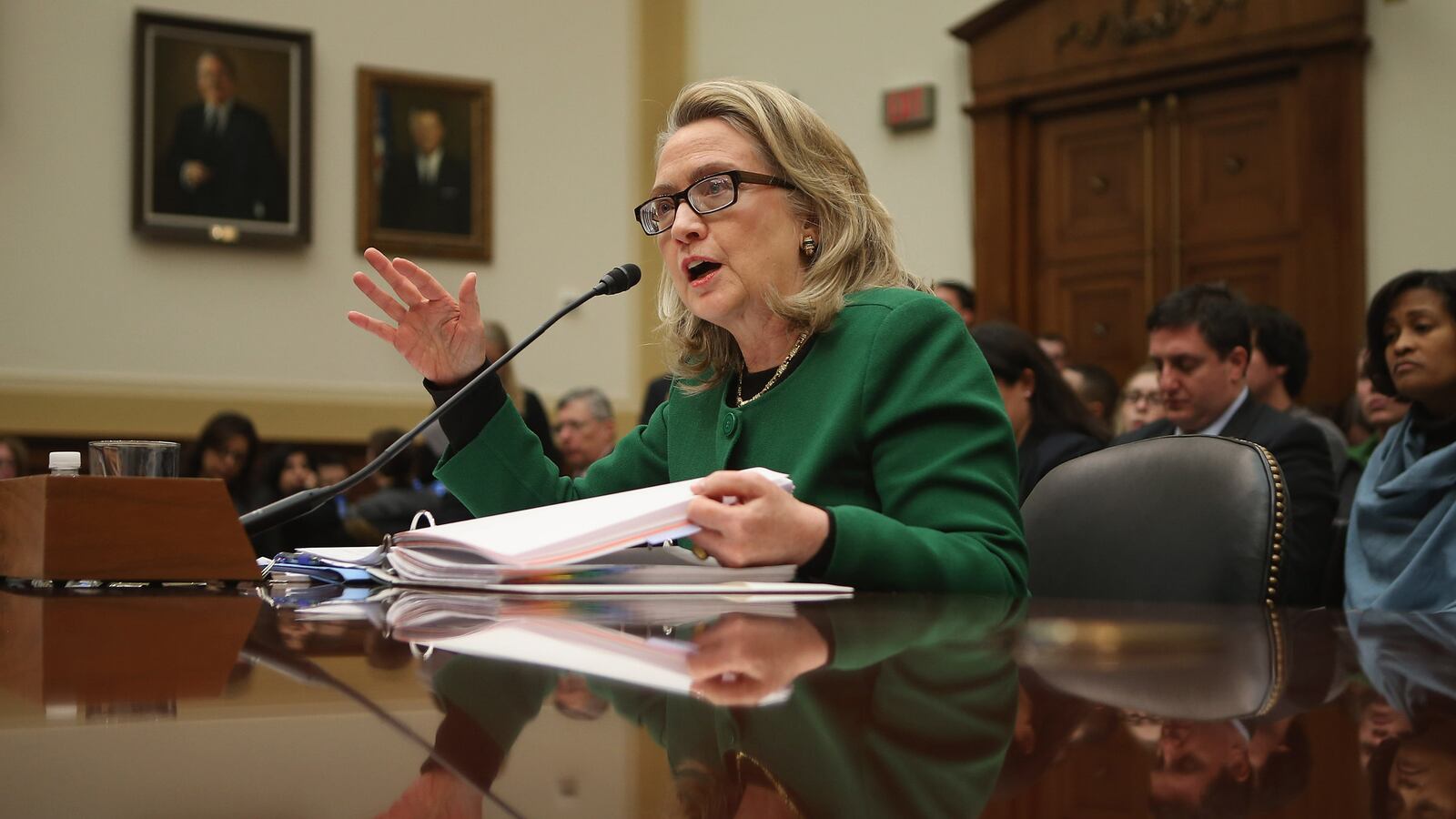Benghazi. Algeria. This is the ground where Americans have been killed by Islamist terrorists over the past four months. And so far, nothing has been done to avenge their deaths.

“Avenge.” That’s the word President Obama used when he spoke to the widow of Sean Smith after his murder in Benghazi, Libya, on Sept. 11, 2012, as recounted by Michael Hastings in his bracing new book, Panic 2012.
It was a sentiment the president repeated the day after the attack to a campaign crowd in Nevada, saying: “We want to send a message to all around the world who would do us harm. No act of violence will shake the resolve of the United States of America ... I want to assure you we will bring their killers to justice.”
It is now late January. There has been no justice. There has been no vengeance. There have, of course, been accusations and congressional hearings. Political finger-pointing has been the preoccupation, but action has been lacking.
On Wednesday, Secretary of State Hillary Clinton more than held her own in the cross-examination from occasionally hostile senators and members of Congress. But one line of questioning revealed the weakness of the administration’s response to date. Sen. James Risch (R-Idaho) asked Clinton about the whereabouts of one of the prime suspects detained in Tunisia and even interviewed in the days after the Benghazi attack.
Here is what she said:
“We have been assured that he is under the monitoring of the [Tunisian] court. He was released, because at that time—and [FBI] Director [Robert] Mueller and I spoke about this at some length—there was not an ability for evidence to be presented yet that was capable of being presented in an open court. But the Tunisians have assured us that they are keeping an eye on him. I have no reason to believe he is not still in Tunis, but we are checking that all the time.”
I think most Americans can be forgiven for doubting the suggestion that the Tunisian government is “keeping an eye” on the suspected killer of four State Department officials. This is the diplomatic equivalent of saying “the dog ate my homework.”
Rational frustrations have nothing to do with the ghoulish, opportunistic outrage pumped up by hyperpartisans in the wake of the attack. But four months later, the lack of retaliation sends a dangerous message to our enemies: Americans can be killed with impunity. Such a message only encourages future aggression. Add to that the unrequited murders of four Americans working in Algeria.
Think back to al Qaeda attack on the USS Cole in the fall of 2000 that killed 17 American sailors and injured many more. There was no direct retaliation—only a lot of inconclusive inquiries. One year later, the attacks of 9/11 occurred. The atmosphere of impunity only encouraged aggression on our own soil.
I called the former commander of the Cole, Kirk Lippold, to get his take on the high-profile congressional inquiry with Clinton.
“There was never any kind of bold statement that we were going to hunt them down and kill them,” he said, “which to me is a reflection of administration policies ... We saw that pattern at the end of the Clinton administration and paid for it dearly at the start of the Bush administration.”
“It’s an impulse to develop evidence for a court case rather than a military action,” Lippold said. “I experienced it firsthand [with the Clinton-administration inquiries]. We kept being told that we needed more evidence ... They didn’t want to admit that al Qaeda attacked the USS Cole.
“For years, back to the embassy attack in Beirut in 1983, Americans were willing to live with fellow Americans being killed, as long as it was overseas. That was up to and through the USS Cole. That mindset can’t be allowed to exist in a post-9/11 world, whether it’s one American or 100, and that has to be a clearly articulated foreign-policy objective.”
In fairness, the Obama administration has developed a successful record of killing al Qaeda leadership, from Osama bin Laden on down. The White House has been relentless in deploying drones and surgically striking AQ leadership while winding down our boots on the ground. In many ways, Obama’s strategic response has been more successful and sustainable than his predecessor’s. But faced with the recent killings of Americans by al Qaeda offshoots in North Africa, the response has been confused—tough rhetoric combined with inconclusive results and unsteady resolve.
This matters. So much of geopolitics is a matter of credibility. Some forces, unfortunately, only understand the language of uncompromising strength. We supposedly learned that again after the attack on the USS Cole. But here we are, mourning American dead while their killers walk free. It makes us look weak. It undercuts the idea of justice. And every day that goes by makes justice more difficult to attain, as the attack recedes in the rearview mirror of history.
No doubt, that is not the intention of the Obama administration. But it is the effect. There is every reason to feel a sense of urgency. After four months, however, a sense of urgency seems to be absent. It is in the president’s power to prove us all wrong and remind the word that America never forgets. But the clock is ticking, and every day the credibility gap grows.
We cannot know just how terrorists might be emboldened by the idea that they can kill Americans without painful retaliation. But it cannot be a positive precedent. Al Qaeda and its offshoots “do not have the operational planning capability right now to pull off a 9/11-type attack,” said Lippold. “But if [the Obama administration] does nothing to respond to these attacks, they will regroup, find a safe haven, and then they will find that capacity, and they will come after us again.”






